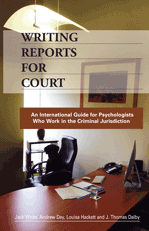Writing Reports for Court: A Practical Guide for Psychologists Working in Forensic Contexts
Jack White, Andrew Day, and Louisa Hackett
University of South Australia"We owe a debt of gratitude to the authors for their excellent effort in providing what will surely become essential reading material for forensic psychology courses throughout Australia." Professor James Ogloff, Monash University
The credibility of a psychologist called upon to prepare a report for court as an expert witness will be questioned if the document presented is viewed as poor. The court will place little weight on the report and the psychologist's professional reputation will be placed at risk. Complaints against psychologists to registration boards, ethics committees and litigation proceedings are frequently the consequence of poor psychological reports.
it is vital therefore that psychologists receive guidelines to assist with the preparation of these reports to the same degree of precision they receive for the writing of the ubiquitous American Psychological Association (APA) formatted research report.
This text examines relevant mental health state legislation relating to criminal, civil and family courts and then sets out a logical structure for writing reports for such matters. The use of psychological tests and their utility in providing useful objective data for courts is also examined. Three chapters are devoted to questions central to an expert offering an 'opinion' in court.
Featuring numerous case studies to illustrate the applicability of the information provided, this book serves as an excellent text for all psychologists considering a career in forensic work as well as any working psychologist who may find themselves in a court setting.
The credibility of a psychologist called upon to prepare a report for court as an expert witness will be questioned if the document presented is viewed as poor. The court will place little weight on the report and the psychologist's professional reputation will be placed at risk. Complaints against psychologists to registration boards, ethics committees and litigation proceedings are frequently the consequence of poor psychological reports.
it is vital therefore that psychologists receive guidelines to assist with the preparation of these reports to the same degree of precision they receive for the writing of the ubiquitous American Psychological Association (APA) formatted research report.
This text examines relevant mental health state legislation relating to criminal, civil and family courts and then sets out a logical structure for writing reports for such matters. The use of psychological tests and their utility in providing useful objective data for courts is also examined. Three chapters are devoted to questions central to an expert offering an 'opinion' in court.
Featuring numerous case studies to illustrate the applicability of the information provided, this book serves as an excellent text for all psychologists considering a career in forensic work as well as any working psychologist who may find themselves in a court setting.
You might also be interested in:

